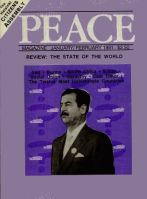
Peace Magazine Jan-Feb 1991, page 28. Some rights reserved.
Search for other articles by Ross Smyth here
Search for other articles by Mac Scott here
By Ross Smyth
NEW YORK-The first Conference on a More Democratic United Nations (CAMDUN), held in New York in mid-October 1990, was a pioneering step towards the creation of a world democracy. Delegates from every continent presented methods of achieving a Second Assembly or People’s House at the United Nations.
Co-conveners of the conference were Dr. Jeffrey J. Segall of London and Dr. Harry Lerner of New York. A network in support of the proposal was launched seven years earlier and developed into the International Network for a U.N. Second Assembly (INFUSA), which now numbers over 100 organizations.
Therese Paquet-Sevigny, U.N. Under-Secretary-General (Public Information), the opening speaker, provided advice for all peace activists: “Every day talk to ten others not in your group.” The many speakers and panelists included Saul Mendlovitz, Benjamin Ferencz, Harold Stassen, Yuri Goryachev, Walter Hoffmann, Hanna Newcombe and Ramses Nassif. To maintain the momentum three conferences will be held on different continents, next year’s being in Europe in either Malta or Vienna. Closing speaker Frank Barnaby, former director of the Stockholm International Peace Research Institute, will edit conference proceedings into a book, and the Soviet delegation offered to edit a regular newsletter.
The Conference on a More Democratic U.N. immediately followed a two-day meeting of the World Citizens Assembly where the idea for the New York meeting originated. Among its outstanding speakers were former U.N. Assistant Secretary General Robert Muller and Canada’s Doug Roche on global education.
During the two conferences the World Government Organizations Coalition (WGOC) met and elected Ross Smyth of Montreal to succeed Rick Wicks ofWashingtonas its chairman. The WGOC consists of 25 organizations and editors dedicated to the goal of federal world government.
By Macdonald Scott
OTTAWA- Chief Daniel Ashini of the Innu Nation along with 115 other activists was arrested on Tuesday November 13th while shutting down the War Department (Department of National Defence) for 2 hours. Police officers used batons and sometimes fists to remove the protestors, all of whom were charged with mischief. All but two were released later that day. A major success was the fact that, despite the NATO base’s being cancelled 116 people still felt the issue important enough to get arrested. This is especially important since the possibility has arisen of the current base’s being expanded to over 18,000 flights year, and the possible construction of a live testing range. Also important is the focus on sovereignty given by both the Innu and the Alliance for Non-Violent Action.
The action was the culmination of a year’s work by the Innu Nation and the Alliance for Non-Violent Action in building a walk from Halifax and Windsor to Ottawa. The walk achieved the objectives of reaching small communities with the Innu people’s message of freedom and sovereignty, of building a large and effective civil disobedience action, and of bringing the Innu closer to the people working in solidarity with them. The Innu participating in the walk included community leader Elizabeth Penashue and Innu U.N. Representative Penote Ben Michel. Coinciding with an Innu victory in the Sheshashit schools (they gained tentative control over the board in one of the major Innu communities) the action and walk were a step forward for the Innu people and for the freedom of First Nations.
The Canadian Peace Movement lost a good friend in September, when anthropologist Kathleen Gough Aberle died of cancer at age 65. A life-long fighter for peace and justice, Kathleen was active in the Campaign for Nuclear Disarmament, the civil rights movement, and the struggle to end the war in Vietnam. Although she was a distinguished scholar with a world-wide reputation, she risked her career whenever she felt it necessary. She was fired from Brandeis University for speaking out during the Cuban missile crisis. At the University of Oregon, she and her husband David Aberle were very active in the movement to stop the Vietnam war. later she and seven colleagues were fired from Simon Fraser University in Vancouver for defying the administration over issues of academic freedom and students’ rights. Although she was passionately committed to the issues she cared about, she was also a person of great warmth and commitment to her friends and students.
Out of her anti-war work, she became an expert on the people and society of Vietnam. Her final book, Political Economy in Vietnam, will be released soon.

Peace Magazine Jan-Feb 1991, page 28. Some rights reserved.
Search for other articles by Ross Smyth here
Search for other articles by Mac Scott here